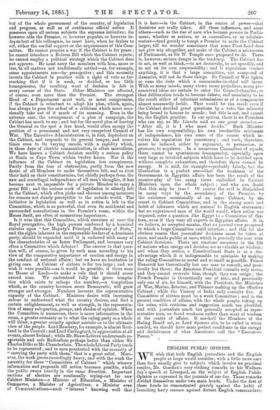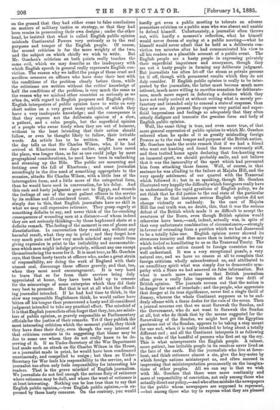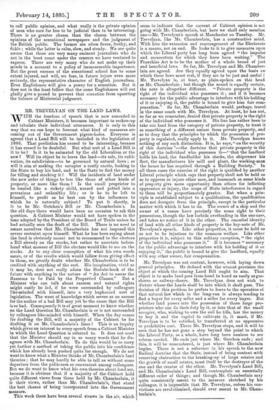ENGLISH PUBLIC OPINION.
WE wish that both English journalists and the English people at large would consider, with a little more care than they usually give to subjects which involve no practical resolve, Mr. Goschen's very striking remarks in his Wednesday's speech at Liverpool, on the subject of English Public Opinion as expressed in the journals of our day. These remarks divided themselves under two main heads. Under the first of these heads he remonstrated gravely against the habit of launching hasty censure against distant English commanders, on the ground that they had either come to false conclusions on matters of military tactics or strategy, or that they had been remiss in prosecuting their own designs ; under the other head, he insisted that what is called English public opinion misleads Continental Powers very seriously as to the real purposes and temper of the English people. Of course, the second criticism is far the more weighty of the two, and the subject on which chiefly we wish to write. But Mr. Goschen's criticism on both points really touches the same evil, which we may describe as the inadequacy with which English speech in general really represents English conviction. The reason why we inflict the pangs of these cruel and needless censures on officers who have done their best with the conditions of the problem clearly before them, while the criticisms are written without the critics' knowledge of half the conditions of the problem, is very much the same as the reason why we mislead other countries so seriously as we often do, with regard to English purposes and English policy. English interpreters of public opinion have to write on very short notice on a very great many subjects, of which they have a very inadequate knowledge ; and the consequence is that they express not the deliberate opinion of a slow, a patient, and a calm people, but the superficial opinion of a people who swear freely when they are out of humour, without in the least intending that their action should follow, or even be thought likely to follow, their irritable words. An article has to be written. The news of the day tells us that Sir Charles Wilson, who, if he had arrived at Khartoum two days earlier, might have saved the place, was longer than, so far as one could judge by mere geographical considerations, he need have been in embarking and steaming up the Nile. The public are mourning and fretting over the fall of Khartoum ; and some journalist accordingly in the dire need of something appropriate to the occasion, attacks Sir Charles Wilson, with a little less of the interrogative form, and a little more of the categorical form, than he would have used in conversation, for his delay. And this rash and hasty judgment goes out to Egypt, and wounds the feelings of one of the most gallant officers in the service by its reckless and ill-considered taunt. Well, the mischief is simply due to this, that English journalists have no skill in what we may call expressive reticence. They grasp eagerly at something definite to say, and never think of the far-reaching consequences of wounding men at a distance—of whom indeed they are not seriously thinking—by those haphazard shots at a definite remark. The feeling of the moment is one of gloom and dissatisfaction. In conversation they would say, without any harmful result, what they say in print ; and they forget how very much pain and how very much mischief may result from giving expression in print to the irritability and unreasonableness which men might indulge privately, without any one except themselves being the worse for it. It is most true, as Mr. Goschen says, that these hasty taunts at officers who, under a great strain of responsibility, are doing the work of England with their utmost zeal, discourage these officers gravely, and that, too, when they most need encouragement. It is very hard to learn that so far from their services being duly appreciated at home, they have been held up to censure for the miscarriage of some enterprise which they did their very best to promote. But that is not at all what the offending journalist intended. If he had had time to think, in the slow way responsible Englishmen think, he would rather have bitten off his tongue than pronounced a hasty and ill-considered judgment intended to take any practical effect. The mischief of it is that English journalists often forget that they, too, are ministers of public opinion, as gravely responsible as Parliamentary officials for the justice of their remarks. Yet if they publish the most interesting criticism which the moment yields, they think they have done their duty, even though the very interest of that criticism consists in its suggesting that blame may be due to some one whom they do not really know to be deserving of it. If an Under-Secretary of the War Department had made such an attack on Sir Charles Wilson in the House, as a journalist made in print, he would have been condemned unanimously, and compelled to resign ; but then an UnderSecretary for War feels his responsibility to the service, and a journalist too often only feels responsibility for interesting his readers. That is the grave mischief of English journalism. We journalists do not feel enough the serious duty of reticence where reticence may be dull, and where the want of reticence is at least interesting. Nothing can be less true than to say that English public opinion,—true English public opinion,—is expressed by these hasty censures. On the contrary, you would hardly get even a public meeting to tolerate an adverse premature criticism on a public man who was absent and unable to defend himself. Unfortunately, a journalist often throws out, with hardly a moment's reflection, what he himself would never dream of saying at a public meeting—what he himself would never admit that he held as a deliberate conviction ten minutes after he had communicated his view to all his readers as a plausible account of a public event. The English people are a hasty people in expressing privately their superficial impatience and annoyance, though they are not a hasty people in forming any deliberate judgment. But journalists too often let-off the steam as private persons let it off, though with permanent results which they do not duly consider. If English public opinion is really to be interpreted by the journalists, the latter must become much more reticent, much more willing to sacrifice sensation for deliberateness, much more expert in deferring a decision which they have not really arrived at without writing what is merely perfunctory and intended only to conceal a state of suspense, than they now are. At present they express very partial and superficial impressions and feelings so adequately that they often utterly disfigure and travestie the genuine form and body of English public opinion. Well, the same thing is true, and even more true, of that more general expression of public opinion to which Mr. Goschen referred when he spoke of it as greatly misleading foreign Powers as to the real temper and purpose of the British nation. Mr. Goschen made the acute remark that if we had a friend who went out hunting and found the fences extremely stiff, and then trotted home again declaring that fox-hunting was an immoral sport, we should probably smile, and not believe that it was the immorality of the sport which had prevented him from attacking those fences. Well, of course, in that sentence he was alluding to the failure at Majuba Hill, and the very speedy settlement of our quarrel with the Transvaal which followed it ; but in so speaking, though Mr. Goschen illustrated very happily the difficulty which foreigners really have in understanding the rapid gyrations of English policy, we do not think that he did justice to the real state of the particular case. For in that instance serious English opinion did not change violently or suddenly. In the case of Majuba Hill the real truth was, no doubt, this, that it was the serious defeat of the British which made it so difficult to accept the overtures of the Boers, even though British opinion would otherwise have been,—and, indeed, actually was, in spite of that very unfortunate combination of circumstances —strongly in favour of retreating from a position which we had discovered to be a totally false one. English opinion never showed its strenuous tenacity and fibre more than in insisting on a treaty which looked so humiliating to us as the Transvaal Treaty. The puzzle which our action caused to foreign countries we can well understand. It was a very exceptional puzzle, a very natural one, and we have no reason at all to complain that foreign criticism wholly misunderstood us, and attributed to an unmilitary spirit what was simply due to democratic sympathy with a State we had annexed on false information. But what is much more serious is that British journalism often gives a really false impression of the true drift of British opinion. The journals scream out that the nation is in danger for want of ironclads ; and the people, who appreciate that danger at its true significance, never feel a single thrill of dismay, whereas the whole Continent supposes us to be sud denly aflame with a fierce desire for the role of the ocean. Then a journal screams out that we must Sarawak the Soudan, and the Government, who do not want to Sarawak the Soudan at all, but who do think that by the means suggested for the Sarawaking of the Soudan, we might best get the Egyptian garrisons out of the Soudan, appears to be taking a step meant for one end, when it is really intended to bring about a totally different end • and all the Continent interprets it as following in the wake of the handful of persons who first set up the cry.
This is what misrepresents the English people. A calmer, more patient, less irritable people in its resolves never lived on the face of the earth. But the journalists who live at fever heat, and think reticence almost a sin, give the key-notes by which foreign nations misinterpret us, and often succeed in impressing that misinterpretation permanently on the imagina tions of other peoples. All we can say is that we wish with Mr. Goschen that there were more continuity and more of responsibility of conviction, not only among those who actually direct our policy,—and who often mistake the newspapers for the public whom newspapers are supposed to represent, —but among those who try to express what they are pleased to call public opinion, and what really is the private opinion of men who care far less to be judicial than to be interesting. There is no greater chasm than the chasm between the opinions of the sensational newspapers and the judgment of the British public. The former are often fierce, frothy, and fickle ; while the latter is calm, slow, and steady. We are quite aware that there are very many eminent journalists who do not in the least come under the censure we have ventured to express. There are very many who do not make up their minds in a moment to a policy of immeasurable importance. But the great success of the sensational school has to some extent injured, and will, we fear, in future injure even more seriously, the representative character of English journalism. Even Englishmen will give a penny for a sensation. But it does not in the least follow that the same Englishmen will not gladly give a pound to prevent that sensation from upsetting the balance of Ministerial judgment.




































 Previous page
Previous page